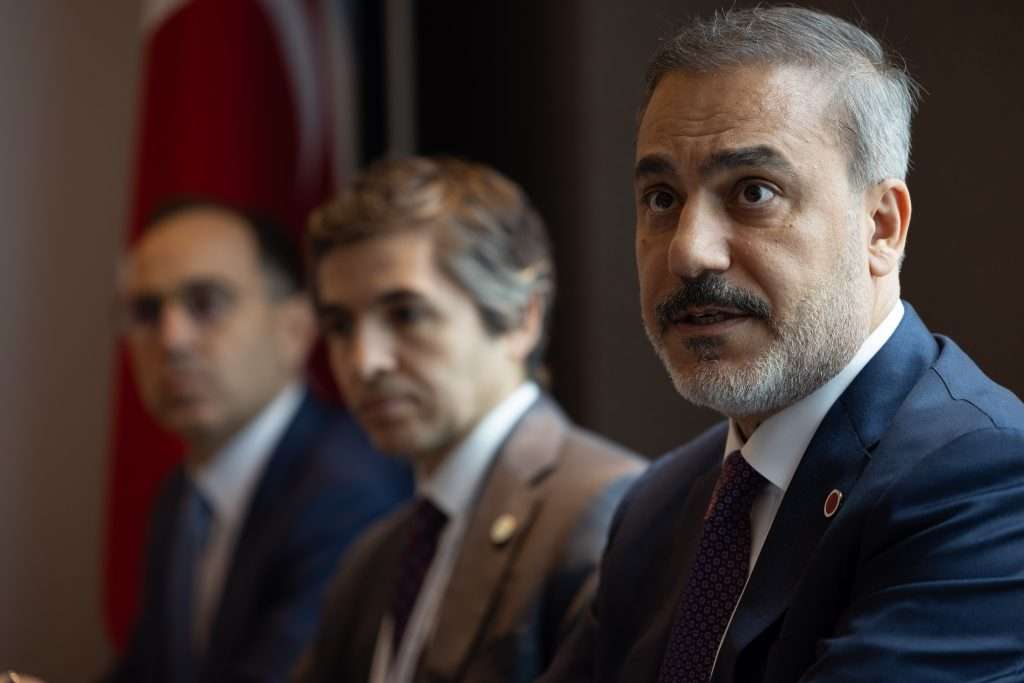Turkish FM attends talks on Cyprus as Libya tensions rise

Sec. Antony Blinken and Turkey Minister speak during their meeting on the first day of the Ukraine Recovery Conference in London on June 21, 2023. Leaders and representatives from more than 60 countries are in London for a two-day conference to secure funding to help Ukraine recover from the ravages of war. (Official State Department photo by Chuck Kennedy)
The Foreign Minister of Turkey, Hakan Fidan, headed to New York on July 16th for UN-hosted talks on Cyprus, as tensions rise in Libya. The meeting was hosted by UN Secretary-General António Guterres, according to Al-Monitor on July 15th.
The talks have taken place against a backdrop of mounting pressure in the Eastern Mediterranean surrounding a disputed Turkey-Libya maritime deal, which remains unratified by the parliament of Libya.
Sources from the Foreign Ministry of Turkey said that its minister travelled to New York alongside the Cypriote President Nikos Christodoulides and Northern Cyprus President Ersin Tatar. The goal of the talks is to “improve the culture of cooperation” between the opposing Cypriot administrations.
Cyprus remains ethnically divided since 1974 between the majority Greek-Cypriot Republic of Cyprus and the Turkish Republic of Northern Cyprus. The UK, Greece and Turkey are guarantors of the island.
Despite the fact that the five parties aimed to smooth out issues during March 2025 talks in Geneva, one of the major contentions that remains surrounds the rising tensions in the Eastern Mediterranean over the Turkish-Libyan maritime deal.
Libya’s parliament in the east is considering approving the agreement that Turkey already signed with the rival internationally-recognised government in 2019. However, the parliament based in Libya’s western capital of Tripoli has questioned the agreement and recently considered it for parliamentary review.
The treaty has come under fire by the international community, especially from Greece and the Republic of Cyprus, which claim it violates their maritime boundaries. Meanwhile, EU leaders declared that the agreement is not legally binding, given a continuous diplomatic effort by Greece and Cyprus to prevent its ratification by the Libyan parliament.
Turkey reacted to the EU’s decision, as its Foreign Ministry spokesperson Oncu Keceli, said in a statement on X: “The conclusions demonstrate that Greece and the Greek Cypriot administration continue their efforts to impose their maximalist claims,” he added: “Turkey will firmly continue to defend its legitimate rights and interests in the Eastern Mediterranean.”
The Tobruk parliament is under the de facto control of the Libyan National Army, aligned with Khalifa Haftar, who was originally against the 2019 maritime agreement. But he has softened his stance after being approached by Ankara. Haftar was considered an ally of Greece but his relations with the country have soured recently following the influx of migrant arrivals from eastern Libya. The Tripoli-based parliament of the Government of National Unity, on the other hand, has been backed by Turkey since 2019 and has often been given direct military ground support in its conflict with the Tobruk-based government.
There has been renewed diplomatic engagement between Greece and other players in the region to counter Turkey’s influence. The foreign ministers of Greece and Egypt have been in dialogue over their shared disagreement with the maritime agreement.
The UN meeting with Turkey’s foreign minister comes amid increased geopolitical posturing by Ankara in countries including Syria, Iraq and Sudan.
Al Monitor, Maghrebi.org
Want to chase the pulse of North Africa?
Subscribe to receive our FREE weekly PDF magazine












